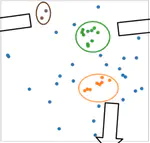The HINTS Lab
Help through Intelligent Support
The Help through INTelligent Support (HINTS) Lab, directed by Dr. Thomas Price, works to develop learning environments that automatically support students with AI and data-driven help features. With a focus on computing education, our goal is to reimagine programming environments as adaptive, interactive systems that help students to pursue learning goals that are meaningful to them. We believe that every student should be able to learn computing with the support they need to be successful, working on projects that match their values and interests. Our research emphasizes practical methods that can scale to new classrooms and contexts, without placing additional burden on instructors. Examples of our research include:

- Supporting students to design and implement on open-ended programming projects.
- Generating data-driven programming help, such as hints and worked examples.
- Developing machine learning models to better understand student code and predict learning outcomes.
- Understanding how programmers seek and use help from web-based help, AI systems, and humans.
- Evaluating the impact of programming support in classroom and lab studies.
For more about our research, see this video:
Projects
HINTS Lab Director
Thomas W. Price is an Assistant Professor in the Computer Science Department at North Carolina State University, where he runs the HINTS Lab. He is also a part of NCSU’s Center for Educational Informatics.
Thomas’ research goal is to re-imagine educational programming environments as adaptive, data-driven systems that support students automatically as they pursue learning goals that are meaningful to them. His work has focused on the domain of computing education, where he has developed techniques for automatically generating programming hints and feedback for students in real-time by leveraging student data. His HINTS lab focuses on supporting students working in creative, open-ended and block-based learning contexts, leading to novel data-driven programming support, including adaptive examples, subgoal feedback, and models to predict student outcomes.
To learn more about me, check out:
Download my CV.
- Computing Education Research
- Educational Data Mining
- Advanced Learning Technologies
- Human-Computer Interaction
-
Ph.D. in Computer Science, 2018
North Carolina State University
-
M.S. in Computer Science, 2015
North Carolina State University
-
B.S. in Computer Science, 2013
Elon University
Recent Publications
See some of our most recent work or view all publications here.



